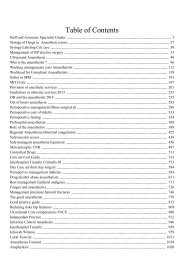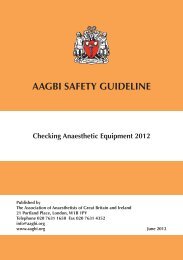pdfjoiner
Create successful ePaper yourself
Turn your PDF publications into a flip-book with our unique Google optimized e-Paper software.
Anaesthesia 2016, 71, 326–337<br />
Management of hypertension before elective surgery guidelines<br />
mon terminology in diagnosis and referral, explaining<br />
the impact of anaesthesia on blood pressure and vice<br />
versa to the wider, non-anaesthetic community. At the<br />
same time, it will review current best practice on the<br />
measurement, diagnosis and treatment of hypertension.<br />
Why does this statement differ from existing<br />
guidelines?<br />
Pre-operative blood pressure management involves<br />
many specialties and professions: primary care, general<br />
medicine, cardiology, endocrinology, pre-operative<br />
assessment clinics and, of course, both anaesthetists<br />
and surgeons. This list is not exhaustive. This guideline<br />
should be a useful summary for all those clinicians<br />
and for patients. The guidance takes into account not<br />
just the best clinical evidence, but the particular pattern<br />
of referral for treatment within the NHS in all<br />
four countries of the UK.<br />
Introduction<br />
The National Institute for Health and Care Excellence<br />
(NICE) has described hypertension as ‘one of the most<br />
important preventable causes of premature morbidity<br />
and mortality in the UK’ [1]. The Association of<br />
Anaesthetists of Great Britain and Ireland (AAGBI),<br />
together with the British Hypertension Society, felt<br />
there was a need for a nationally agreed policy statement<br />
on how to deal with raised blood pressure in the<br />
pre-operative period. We have based this statement on<br />
a consensus view with the backing of graded evidence,<br />
where such evidence is available.<br />
Hypertension is almost always asymptomatic and<br />
it is diagnosed following screening in general practice.<br />
Managing hypertension pre-operatively is a complex<br />
matter of balancing the risks of anaesthesia, treatment<br />
and delay for the individual patient. Most cases of<br />
hypertension are primary, i.e. with no other medical<br />
cause. For the remainder, the cause for hypertension<br />
may be associated with the reason for the proposed<br />
operation.<br />
Cancellations and postponements of planned surgical<br />
procedures have been a major and long-standing<br />
problem for healthcare worldwide. The quantifiable<br />
loss of resource is pitted against unquantifiable and<br />
significant psychological, social and financial implications<br />
of postponement for patients and their families.<br />
Although guidelines exist for the treatment of elevated<br />
blood pressure, there remains a paucity of literature<br />
and accepted guidelines for the peri-operative<br />
evaluation and care of the patient with hypertension<br />
who undergoes non-cardiac surgery [4]. Of particular<br />
importance is defining the patients most vulnerable<br />
to complications and the indications for immediate<br />
and rapid antihypertensive treatment and/or postponement<br />
of surgery to reduce these risks pre-operatively,<br />
intra-operatively and postoperatively. Perioperative<br />
hypertension often occurs in conjunction<br />
with sympathetic nociceptive stimulation during the<br />
induction of anaesthesia, during surgery and with<br />
acute pain in the early postoperative period. Hypertension<br />
may also accompany hypothermia, hypoxia or<br />
intravascular volume overload from excessive intraoperative<br />
fluid therapy, particularly in the ensuing<br />
24–48 h as fluid is mobilised from the extravascular<br />
space [4–6].<br />
There are no nationally agreed guidelines for the<br />
diagnosis or management of raised blood pressure<br />
before elective surgery. The evidence regarding the<br />
effect of raised pre-operative blood pressure is very<br />
limited. Local guidelines do exist but vary from area to<br />
area. Both the AAGBI and the British Hypertension<br />
Society recognised the need for a national guideline<br />
and consensus statement to address the various issues<br />
of concern. We have limited our deliberations to a<br />
specific scope. Only the period before planned surgery<br />
is covered. Blood pressures which may cause an immediate<br />
risk to health are specified, rather than those that<br />
may cause risk over the long-term. The best method of<br />
taking accurate blood pressure measurements is examined.<br />
We considered how long blood pressure should<br />
be controlled before surgery is undertaken. Communication<br />
between different hospital departments, primary<br />
care and the patient are of importance. We hope that<br />
by providing national guidance the chances of a<br />
patient receiving conflicting advice will be minimised.<br />
Scope<br />
This guideline is aimed at adults presenting for<br />
planned surgery. The following groups of patients are<br />
specifically not studied, although many of the general<br />
points covered in the guideline may apply.<br />
328 © 2016 The Authors. Anaesthesia published by John Wiley & Sons Ltd on behalf of Association of Anaesthetists of Great Britain and Ireland.





